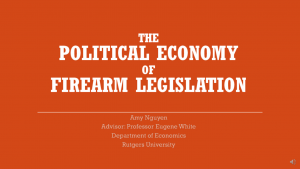Nguyen, Amy: The Political Economy of Firearm Legislation
Title: The Political Economy of Firearm Legislation
Name: Amy Nguyen
Major: Economics
School affiliation: School of Arts and Sciences
Programs: Honors College Capstone
Other contributors: Eugene White
Abstract: As mass shootings terrorize the U.S., why has Congress not responded with increased gun control? To address this question, my study examines the determinants of voting on firearm legislation. Adapting a political economy model originally used to analyze mortgage legislation and using a linear probability regression, I examine the effects of constituent interests, special interest groups like the National Rifle Association (NRA), political ideology, and mass shootings on how senators voted in three roll call votes. The results show that mass shootings are polarizing events, where a senator’s voting response to an outbreak of mass shootings depends on his or her ideological outlook. For my preferred model, an additional victim increases the likelihood a senator with the median Republican ideology score will vote for increased gun control by only 1.2%; in contrast, a senator with a median Democrat score would be 15.4% more likely to vote for increased gun control. To counter these shifts in voting, the NRA would need to spend about $141,000 and $1,771,000 respectively. The results are sensitive to the varying measures of mass shootings drawn from different databases. Using sources that focused on highly publicized shootings or excluding injured victims can substantially alter the results.
